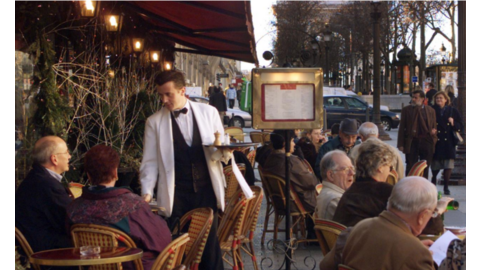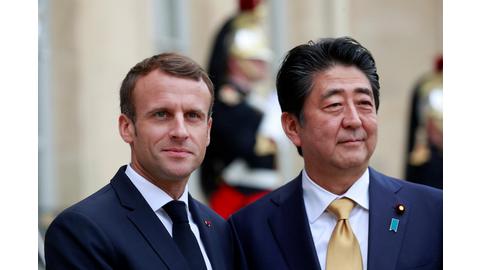Vive La France: The French Tech Companies Taking On The World

The French tech scene is populated by huge multinational organisations, telco giants and emerging startups. Here are some of the most influential
Last week was Bastille Day, the French national holiday, commemorating the storming of the Bastille, a pivotal moment in the French Revolution of 1789.
It’s a tenuous link but we thought what better time to take a look at the country’s technology industry and profile some of the biggest firms
They range from huge organisations like Atos, telco giants Orange, and the innovative young companies that comprise France’s burgeoning startup community – particularly in the field of adtech.
So here are some of the biggest names in French technology and their stories. Vive la France!
Atos
Based in the Parisian suburbs, Atos is a multinational IT services company whose clients have included the UK government, the BBC and the European Union. It is also the company responsible for compiling the Premier League football fixtures.
Its areas of expertise cover virtually the entire IT ecosystem, including applications, systems integration, big data, data centre management and security.
Atos has served as an official Olympic partner since the 2002 Salt Lake City Winter Games and was instrumental in the delivery of London 2012. However its involvement in the Paralympic Games has been questioned by critics of the fit for work disability and work capability assessment.
The company exited that contract a year early in 2014, just weeks after the 2014 Sochi Winter Games.
Schneider Electric
As the name suggests, Schneider Electric specialises in energy and automation and has become a major player in the fields of cloud and the Internet of Things (IoT) – important components of Industry 4.0.
The company has been working on energy efficiency in data centres, modular installations and technology that mitigates the threat of an extend power failure. It is also increasingly focused on the concept of edge computing – bringing analytics closer to the point of collection to improve the speed of processes and reducing the strain in bandwidth.
Recent speculation suggested the company could merge with the UK’s Aveva – meaning it might not be as French as before…
Free
Free Mobile is a classic disruptor. Before its arrival in the French mobile market, it was difficult to find much value as France Telecom/Orange, DFR and Bouyges Telecom ruled the roost and made contracts expensive.
Starting out as a French fixed ISP, Free won a 3G licence in 2009 with a promise to “halve” bills for French consumers. It adopted an “inside out” network architecture model, using its home modems as ‘hotspots’ and combining them with a 2G-3G roaming agreement with Orange. This allowed it to expand rapidly and give it time to build its own mobile infrastructure.
In 2012, it won a 2.6GHz 4G spectrum licence and as of March 2017, Free claims to cover 80 percent of the country with 4G – although it is worth noting that its agreement with Orange is due to expire at the end of 2020.
Criteo
France has emerged as a leader in the field of adtech, which is unsurprising given its heritage. It is home to Publicis, the world’s biggest advertising agency after all.
Criteo is leading the wave of French startups in this field, forming in 2005. It’s engine is able to produce personalised online advertisements to people who have visited the advertiser’s website without buying anything.
The hope is that the creatives can entice the user back to the website with a customised message built on data from various channels.
It has more than 1,500 employees in 24 offices across the world and works with 7,000 advertisers.
Orange (France Telecom)
France Telecom was formed in 1991 when it was separated from the national postal service (La Poste) and was privatised in 1998.
As part of the Ministry of Posts and Telecommunications, the company deployed France’s telephone network and rolled out Minitel – a French predecessor to the World Wide Web. In 2000, it bought mobile network Orange and in 2013 the whole of France Telecom became ‘Orange S.A.’.
Today, France Telecom serves French consumers and businesses as well as multinational companies around the world. It is also a shareholder in BT, acquiring a stake after the sale of EE last year.
Sigfox
Founded near Toulouse, Sigfox’s proprietary Low Power Wide Area Network (LP-WAN) technology is destined to be one of the building blocks of the Internet of Things (IoT).
Sigfox networks are being deployed around the world to connect devices that require low bandwidth and long battery life. This includes the UK, where WND-UK is working on a nationwide network, while Arqiva has built some city deployments.
The system has also been used on on Antarctica, to help the safety of a Belgian expedition undertaking projects related to climate change and sustainability.
The company secured €150 million (£129.4m) in funding last year to accelerate the expansion of its global network.
Deezer
Music streaming service Deezer was founded in Paris in 2007 and has gone on to become one of the most popular services of its type, now boasting 16 million monthly active users and 6 million paid subscribers.
It prides itself on having a library of over 40 million songs (although catalogues do vary from country to country), which are supplemented by 40,000 podcasts to help it stand out from the crowd.
But it hasn’t been an easy ride. Deezer has had to compete with high-profile competitors in the form of Spotify and, more recently, Apple Music.
Also, at the end of last year it was found to be leaking personally identifiable information, including customer and business data, along with a host of other popular mobile website and apps.
DailyMotion
From music to video, DailyMotion is one of the world’s biggest video sharing platforms, offering a mix of content from users, independent creators and premium partners.
It currently attracts around 300 million users globally each month who watch a combined 3.5 billion videos. Impressive numbers, but still a long way behind its biggest rival YouTube which is believed to generate hundreds of millions of hours of video watched every day.
But DailyMotion is still a major player. It was nearly acquired by internet giant Yahoo, before a French government minister blocked the move and accused the US company of wanting to “devour” its smaller competitor.
It also suffered the ignominy of falling victim to a mass cyber attack at the end of 2016 where hackers made off with 85 million account usernames and passwords. DailyMotion was criticized for its handling of the breach, with industry experts condemning its slow response.
Vivendi
Vivendi is a French multinational media conglomerate, with interests in a range of industries including music, television, video games and telecommunications.
Reported revenue for the 2016 fiscal year came in at nearly 11 billion Euros, making it one of the world’s biggest media entities.
This is thanks to Vivendi having several household name brands at its disposal. For example, it owns the French TV channel and film producer, Canal+ Group, leading music producer Universal Music Group, video game creators Ubisoft and Gameloft and video sharing platform DailyMotion.
That’s undoubtedly an impressive armoury and one that still has plenty of room for growth in the future.
Capgemini
Mixing IT consulting, outsourcing and professional services, Capgemini is a global firm based out the supposed city of love, Paris.
Raking in billions of pounds in revenue and employing around 190,000 people, Capgemin is a vast enterprise IT focussed company dating back to 1967, which provides it services to a myriad of sectors, from finance and accounting to supply chain management and cloud services.
Airbus
Famed for its civil aircraft, Airbus is based out of Blagnac in France’s Toulouse suburb and employs around 72,000 people who work on creating planes such as the Airbus A380, the world’s largest passenger airliner.
Staring life as a consortium of aircraft manufacturers in 1970, Airbus aircraft have preformed more than 110 million flights covering a massive 215 billion kilometres catering for the travel of 12 billion customers.
Having produced more than 10,000 aircraft, Airbus has many more flights and miles ahead of it it, though it will need to keep fending off competition from Boeing.
Technicolor
Dating back to 1893, Technicolor is a French multinational company specialising in producing products and services for the world of media.
Based out of Issy-les-Moulineaux, Technicolor is famed for its digital tools for content and audio production, combined with imaging and animation tools and services.
Starting life in the world of cinema, Technicolor had moved into areas such as games and immersive media and provides tool for both artists and scientists alike.
The French startup scene
Of course, the next big French tech firm could come from its startup ecosystem. At the recent Vive Technology conference in Paris, French President Emmanuel Macron spoke of his desire to promote the country’s technology industry and offer policies that promote entrepreneurship.
Crieto and BlaBlaCar are two darlings of the French scene and there are significant amounts of investment being pumped into the sector. A recent Capgemini competition named Lili smart as the most promising GovTech and social enterprise startup and privacy firm Foxintelligence as the most promising security firm.
As part of a European network of sites, you can be sure that Silicon has its ear close the ground when it comes to the next big thing in French tech.
Source: http://www.silicon.co.uk/mobility/4g/french-tech-companies-217411/3?inf_by=5976d8e8671db83d288b49a8


